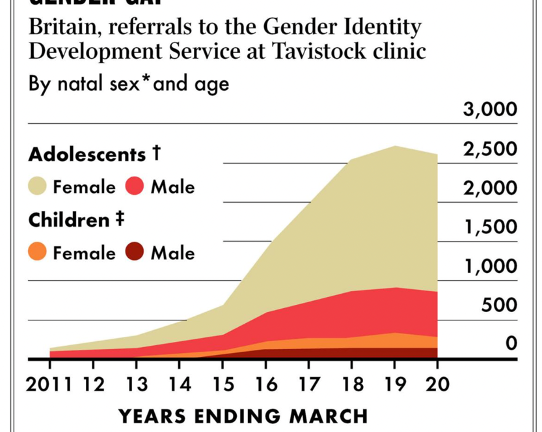In a surprisingly direct editorial on Saturday, the National Post called for Canada to ban gender surgeries for minors and “take inspiration” from the recent reforms in Finland, Sweden and the UK to ensure Canadian gender questioning children receive appropriate and multi-disciplinary care. This significant statement by one of Canada’s leading media outlets came just weeks after the UK announced the closure of the Tavistock gender clinic for children and youth after an independent commission determined the current model was “not a safe or viable long-term option”.
We welcome the National Post’s support in calling for oversight and reform and we agree that the UK situation parallels Canada’s.
How close is Canada to achieving what the UK National Health Service has done? In this review, we’ll break down the key elements that led to the closure of the Tavistock and the UK’s decision to overhaul their gender identity services. Is Canada making any progress along the same lines? Let’s take a look:
Key factors that led to the closure of the Tavistock
Three elements were necessary and played a key role in the closure of the Tavistock: 1) the role of whistleblowers, 2) the commissioning of an independent review and 3) media scrutiny.
These conditions have already changed in Canada over the past month since the UK National Health Service announced it would be closing the Tavistock gender clinic and replacing it with regional centres that would adopt a more “holistic model of care”.
The decision by the UK National Health Service sent shockwaves throughout the world. It’s not every day that a medical model of care that has been applied to children is declared unsafe – let alone one that is enmeshed with a civil rights movement and intense political activism.
The UK will be setting up regional clinics that will offer a holistic model of care. This emphasis on “holistic” is a key change and means that the rush to medicalize children and young people who present with a gender identity that is different from their birth sex will be met with a more cautious duty of care.
The Role of Whistleblowers
The UK has had several whistleblowers come forward over the past years to question the model of care being applied by the clinic. These include Sue Evans clinical staff, Dr David Bell former staff-Governor at the Tavistock and Marcus Evans, clinical psychologist and former director of the Trust that oversaw the Tavistock Clinic.
Of course, there was also a lawsuit by a former patient of the Tavistock. Keira Bell argued that the care she received rushed her into medical transitioning without challenging her to understand other factors that may be influencing her then teenaged-self to seek out changing her body as an answer to the issues she was struggling with at the time.
A respected Canadian pediatrician and gender expert, Dr Joey Bonifacio, has just stepped forward and is publicly calling for caution and for Canadian clinicians to “slow down” their approach. His remarks have been very measured and diplomatic thus far, but this only makes his impact more powerful.
Dr Bonifacio cannot be dismissed as someone who is against any and all forms of gender transition for young people. What he’s pointing out is that the model of care known as “gender-affirming care” is at great risk of being misinterpreted and misapplied.
In the National Post he says: “They think affirmative care is you follow whatever pronouns (patients) care to use and start medication as soon as possible.”
Yet he pointed out that the term is actually supposed to refer to the importance of holistically supporting the patient in their identities and needs and “refrain from directing a child toward any particular identity.” or, needless to say, medicalization.
Dr Bonifacio is a former Medical Director of the SickKids Hospital gender clinic in Toronto. Why is he no longer there?
He is also a former named researcher of the TransYouthCan puberty blocker “study” underway across 10 gender clinics in Canada. Why is he no longer affiliated with this group?
Learning precise answers to these questions isn’t necessary. Dr Bonifacio has first-hand knowledge of the major players setting the direction for youth gender transitioning in Canada. He has also participated in reviewing the practices of other physicians engaged in gender healthcare, at the request of the College of Physicians and Surgeons of Ontario.
He has said he doesn’t discount the idea of peer or other social influences encouraging children and young people into a transgender identity (the social contagion question) and has done his own research on gender transitioning which called for outcomes tracking and more research given all the gaps in understanding that plague the current system.
His point of view is broadly aligned with the determination of the independent review in the UK (the Cass Review) that gender transition needs to be considered within a broader framework of child and adolescent health. This developmentally informed approach is a welcome change from the child-led approach that is being promoted in North America and at Canadian gender clinics such as SickKids Hospital in Toronto.
Consider the difference between these 2 statements:
From the UK Cass Review:
“Staff should maintain a broad clinical perspective in order to embed the care of children and young people with gender uncertainty within a broader child and adolescent health context.”
From SickKids Patient Experience team in response to Canadian Gender Report on behalf of parents of children receiving care at SickKids gender clinic:
“Should medical interventions be a part of a youth’s care goals, the care team determines if the patient is capable to make a decision on a medical intervention.”
The broader health context is an afterthought at SickKids as they go on to state “If conditions are identified that warrant mental health intervention, efforts are made to ensure the youth is connected with appropriate care.”
It is unclear how or when this would happen. For example, we’re aware of a youth who was sexually assaulted a few months prior to suddenly declaring a trans-identity. Although an independent psychologist and expert in gender transitioning recommended against medical transition, this young teenager was able to access hormones at SickKids Hospital.
Under what circumstances would SickKids refrain from offering medical interventions if a child or teenager insisted upon it? (This individual has since detransitioned after several years of hormone use and SickKids also offering the availability of surgery.)
Independent Oversight – The Need for Reviews
Finland, Sweden and the UK have all conducted independent reviews of the evidence behind puberty blockers and other medical interventions being applied to children, as well as the clinical guidance and protocols being followed. In all cases, they have determined that the evidence is “low” and of “low quality” and have determined that the risks of such treatments outweigh the benefits. Supportive psychotherapy is now the first line of treatment in Finland and Sweden and we expect the “holistic” model of care that the UK has signaled will prioritize non-invasive interventions such as supportive therapy over puberty blockers and cross-sex hormones and surgeries.
In all cases in Europe, there was one centralized health authority that took action for the country. In Sweden, the review was sanctioned by the left-leaning Social Democrat Party and was put under the direction of the Swedish National Board of Health and Welfare.
The National Health Service in England in partnership with the NHS’s Improvement Quality and Innovation Committee commissioned the independent review of the Tavistock gender identity development services under the direction of pediatrician Dr Hillary Cass (thus named the Cass Review).
In Canada, healthcare is a provincial responsibility. This decentralization makes it more difficult to identify and convince the necessary responsible parties to take action. Political and government leaders in Canada are likely to “pass the buck”, hoping someone else will catch this hot-potato issue. It is unlikely that healthcare leaders in Canada will move to voluntarily commission the kind of independent review that Finland, Sweden and the UK have undertaken. We’d love to be proven wrong.
It is our view that lawsuits will be the necessary and most efficient path to securing the necessary oversight needed. Even then, it is difficult to foresee how an individual medical malpractice lawsuit would have success in Canada given the onus of responsibility being placed on the young patients and their parents in providing “consent” for these procedures.
This backdrop is why it is particularly important that our media exercise their responsiblity to investigate and develop their own independent view of what is happening in Canada. As the National Post has just recognized, “medical knowledge, as well as the gaps in said knowledge, knows few national boundaries. Canada’s approach to gender care is like skiing down a mountain while blindfolded and ignoring calls to slow down.”
The lack of public debate on youth gender transitioning and the lack of informed reporting by our mainstream media outlets is exacerbating the situation in Canada, not helping it.
Media Scrutiny
Media outlets in the UK were also slow to respond to the early calls for investigation into what was happening with the exponential rise of young people, now mostly adolescent natal females, seeking medical gender transition. This changed dramatically over the past 5 years as the BBC, The Times and The Guardian began to question and expose the dangerous trend and highlight calls by experts and insiders for the need to review the protocols and practices in place.
With very few exceptions, the Canadian mainstream media remains eerily silent when it comes to exposing that there is any question or debate happening with respect to medical transitioning of minors.
The National Post has been paying some attention to the issue over the past 2 years which has led to their recent call for reform of pediatric gender services in Canada.
W5 aired a balanced documentary last year that profiled a UK based detransitioner and a Canadian young person transitioning to the opposite gender. The detransitioner was representative of the growing and unexplained cohort of adolescent females seeking gender transition, while the other individual represented the classic early onset case of gender dysphoria in natal males. This type of case is now a minority of those seen by Canadian gender clinics.
The Globe and Mail hasn’t run a single story about the debate on medical gender transitioning even though their respected staff and editors are very aware of the growing international debate and pull back on the topic.
CTV News exposed their tone-deaf ineptitude by running a fluff piece touting dubious research by trans-activist Jack Turban the same week that the UK National Health Service declared that the model of care being applied in Canada was deemed “not safe” for UK children.
Parents lobbied CTV to retract the article but were only able to gain a modest “correction” at the end to identify a methodology limitation used in the research.
In defence of the CTV, they had picked up the story from the supposedly trusted source of the AAP (the American Academy of Pediatricians). The AAP retracted its own misleading headline that originally promoted the research as confirmation that social contagion is a myth. The CTV let it stand.
Such is the current state of media reporting on this sensitive topic in Canada.
Thankfully, there is a growing public debate happening in the US and international media, including at the Wall Street Journal, the Washington Post and The Economist. Several high profile US gender experts have stepped forward to call for caution and re-evaluation of the rush to medicalize youth who declare a transgender identity. We hope that balanced debate in trusted international media will also have spill over effects here.
Conclusion
The Tavistock closure has created new conditions in Canada that have already helped to move us closer to the public discourse and review that needs to happen. The National Post Editorial calling for reform on how medical treatments are being offered to trans-identified children and young people is an enormous and very significant step forward.
On the announcement of the Tavistock closure, one of the UK whistleblowers, Dr David Bell said: “What must happen now is a cultural overhaul, taking in schools as well as gender clinics.”
Canada is still far away from this kind of reckoning. But it is an important reminder that what happens next will be a reflection of our culture and whether we value all children and their safe passage through the sometimes-difficult stages of growing up or whether we allow ourselves to be taken in by a movement that would offer unquestioned medicalization for what is being called “gender diversity” in children too young to legally get a tattoo.
The draft WPATH Standard of Care v8 for adolescents noted that “gender diversity” should no longer be considered “rare” as almost 10% of the US youth population rated themselves as “gender diverse”. The question being posed by the WPATH adolescent standards committee was: do we really understand which children we are medicalizing and why?
It is our position that the Canadian healthcare system has lost its way in terms of determining whether medical transition is in a child’s best interest and that schools, activist groups and many seemingly well-intentioned individuals, including some therapists, are recklessly influencing children and young people in a manner that not only “affirms” their so-called gender identity, but creates a new kind of social capital around the idea of being “trans” and pushes young people along a path toward unnecessary and high-risk medical interventions.
We will continue to call upon the federal and provincial governments to conduct an independent review of current practices affecting children just as Sweden, Finland and the UK have done. In June, we submitted a Briefing to the Federal Standing Committee on Children’s Health requesting this type of independent review. We’ve not heard anything back from the Committee about our submission, but that document is now part of the public record.





One thought on “National Post calls for reform of transgender treatments in line with UK’s new approach: Now what?”